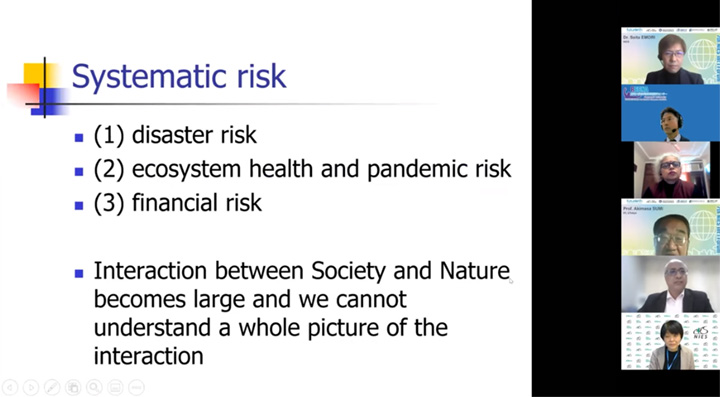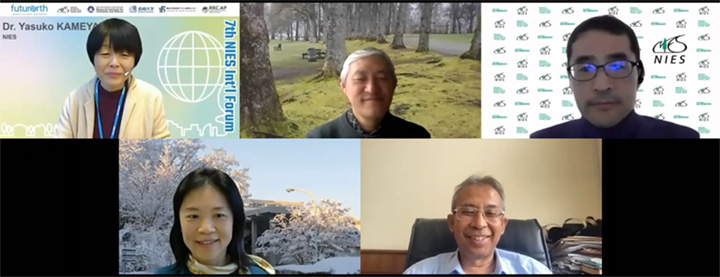Forum report: 7th International Forum on Sustainable Future in Asia / 7th NIES International Forum −Research for Societal Transformation with Future Earth−
The National Institute for Environmental Studies (NIES - Japan) co-organized the 7th International Forum on Sustainable Future in Asia or the NIES international forum on 20 - 21st January 2022. The event was a collaboration between Six organizations, namely NIES, Research Institute for Humanity and Nature (RIHN - Japan), Nagasaki University (NU - Japan), The University of Tokyo, Institute for Future Initiatives (IFI, UTokyo - Japan), Asian Institute of Technology, Regional Resource Centre for Asia and the Pacific (AIT RRC.AP - Thailand), and Future Earth Global Secretariat Hub Japan.
The main theme of the forum is Research for Societal Transformation, which reflects the urgency to shift away from the current business as usual toward more sustainable practices in the context of the climate emergency we are facing. The forum took place shortly before the United Nations Intergovernmental Panel on Climate Change (IPCC) published its Sixth Assessment Report (AR6) in February 2022 that set the anticipated tone to emphasize the crucial moment our global society is at.
The main aim of this forum is to provide a platform for young researchers to present and discuss their works and interest with their more senior fellows to find ways to accelerate transformations for global sustainability. Additionally, the importance of transdisciplinary processes with stakeholders, one of the key ingredients to initiate sustainable transformation was emphasized throughout the event.
The two-day event brought together more than 100 researchers to present and discuss their works. The topics discussed were ranged from (1) Valuing Environment, (2) Net zero GHG emissions by 2050 in a complex world with stakeholders, and (3) Systemic Risk. It also featured three keynote speeches and a Flash talks session, which enable young researchers to present their works for comments and discussion.
On Day 1 (20th January), the Webinar was kicked off by Dr. Giles Sioen (NIES) who hosted the morning session. The opening remarks were made by dignitaries from the organizing institutions and followed by three keynote speeches. The Keynotes highlighted the importance to expand our perspectives when dealing with complex environmental issues; For instance, the importance to acknowledge issues related to nuclear weapons as one of the essential environmental threats (Dr. Michiru Nishida, Nagasaki Univ.); the need to frame environmental values as both tangible and intangible values (Dr. Leena Srivastava, IIASA - Austria), and how complex system risk cannot be accounted unless their direct and indirect interactions are acknowledged (Prof. Ilan Chabay, IASS - Germany). Prof. Chabay concluded that the shaping of future global crises would be highly dependent on how communities prepare for and respond to these disasters, in which narrative can play an important role. The keynotes were followed by a lively discussion facilitated by Dr. Fumiko Kasuga (Future Earth).
Following the keynotes, ten young researchers were given opportunities to share their works in an innovative Flash Talk Session, under the theme Mutual understanding with the society and science, facilitated by Prof. Kazuhiko Moji (Nagasaki Univ.). The session was highly interactive and warrant a follow-up in the subsequent event.
Next, a panel discussion on Society and Science was led by Dr. Seita Emori (NIES), joined by the keynote speakers and Prof. Akimasa Sumi (Univ. of Tokyo) (Photo 1), Prof. Shobhakar Dhakal (AIT), Dr. Yasuko Kameyama (NIES), and Prof. Moji. Key points that stood out from the discussion include; the importance of a robust monitoring process to enable real-time response, the increased role of scientists in decision-making processes (science-based policymaking); and the role of media and communication in science valorization.
The first day was concluded with a remark by Prof. Takeshi Nagayasu (Nagasaki Univ.). The content of the first day of the forum is available on YouTube (https://www.youtube.com/watch?v=YiEe1S5tFF4).

Day 2 of the Seminar was introduced by Dr. Giles Sioen (NIES) and consisted of three expert sessions on (1) Valuing Environment, (2) Net zero GHG emissions by 2050 in a complex world with stakeholders, and (3) Systemic Risk. The expert session provided an opportunity for leading scientists in the field to share their cutting-edge work and open for their younger peers to candidly discuss their works informally.
The first session, titled Valuing Environment, was organized by Prof. Chieko Kondou (Nagasaki Univ) and chaired by Dr. Chris Ng (Univ of Tokyo). Prof Dodik Nurrohmat (IPB Univ, Indonesia), Dr. Takahiro Ota (Nagasaki Univ.), Dr. Kiyoshi Takahashi (NIES), and Prof. Alan Dangour (London School of Hygiene and Tropical Medicine, UK) presented their works. Their talks were focused on different approaches that can be used to examine and identified environmental values. Integrated Assessment Model has established itself as an orthodox approach but works remain to expand its capacity.
Acknowledgments also need to be made on what these approaches can and can not address. Moreover, the need to transform toward more sustainable consumption and production is imminent. It is also important to acknowledge the interdependency between human health and planetary health.
In the second session, the importance of stakeholders in the transformation toward Net Zero GHG emission by 2050 was discussed. Organized by Dr. Hiroshi Tanimoto (NIES), Dr. Giles Sioen (NIES), and shared by Dr. Yasuko Kameyama (NIES), the session brought together four senior researchers; Dr. Kejun Jiang (Energy Research Institute , China), Dr. Tatsuya Hanaoka (NIES), Prof. Boer Rizaldi (Bogor Agricultural University, Indonesia), and Dr. Tomoko Shirai (NIES) to discuss the topics. Dr. Jiang showed technology progress in China to achieve carbon neutrality before 2060 goal. Dr. Hanaoka stressed the importance of “Coal Phase-Down” in Asia. Prof. Rizaldi introduced multiple policies to reduce emission from land use and forestry section in Indonesia. Dr. Shirai presented the latest estimates of Global Carbon Budget (GCB 2021) as a result of international collaboration in the framework of Global Carbon Project (GCP). The session provided its audience with an exciting broad overview of collaborated efforts by different stakeholders, such as scientists, public institutions (national and regional scale), private, and non-governmental organizations, which are being made to address climate issues. Participants reaffirmed the importance of collaboration during the discussion (Photo 2).


